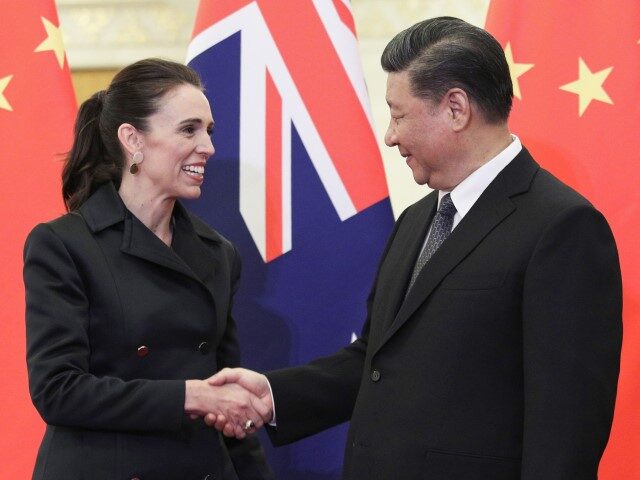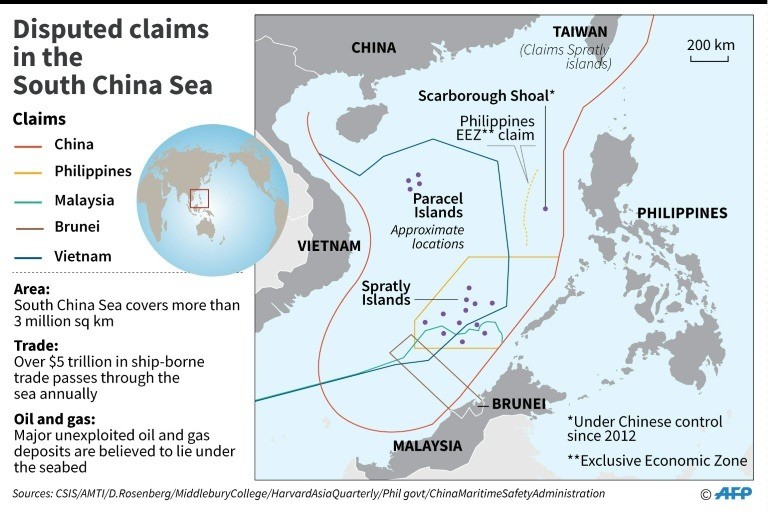The Chinese government newspaper Global Times celebrated radical leftist New Zealand Prime Minister Jacinda Ardern as a “politician who truly understands international politics” on Thursday following her announcement she would resign next month.
While the Chinese Foreign Ministry abstained from remarking on Ardern’s departure as head of government – aside from declaring Beijing “ready to work with New Zealand” generally – the Global Times cited regime-approved alleged “experts” who applauded Ardern for her efforts to bring her country deeper into Chinese Communist Party influence and weaken ties to America and the greater West.
Ardern, who has served as prime minister of New Zealand since 2017, announced on Thursday that she would resign in anticipation of her Labour Party expecting a poor performance in elections this year. Ardern claimed that poor polling was not a factor in her resignation and that she simply was too exhausted to continue with the job.
“I am human. We give as much as we can for as long as we can and then it’s time. And for me, it’s time,” Ardern said. “I am not leaving because I believe we can’t win the election but because I believe we can and will.”
Ardern’s tenure was marked by extreme government repression, particularly the use of the Chinese coronavirus pandemic to ban New Zealanders abroad from entering their country and onerous lockdowns and mandates in violation of citizens’ civil rights. In a particularly embarrassing episode, Ardern’s government refused entry last year to New Zealand journalist Charlotte Bellis who, pregnant and stuck in Afghanistan, was forced to ask the Taliban jihadist organization for protection. The Taliban accommodated her despite her being pregnant out of wedlock – a violation of the Taliban’s interpretation of Islamic sharia – with the kindness denied her by Ardern’s government.

Charlotte Bellis poses in a selfie with her partner Jim Huylebroek in Kabul, Afghanistan. Bellis, a pregnant New Zealand reporter who is expecting her first child with Huylebroek, has chosen Afghanistan as a temporary base for her uphill fight to return home because of her country’s stringent COVID-19 entry rules. Huylebroek, a freelance photographer and Belgium native, has lived in Afghanistan for two years. (Charlotte Bellis via AP)
In international relations, Ardern’s government distinguished itself by expanding friendly relations with the Chinese Communist Party, a genocidal entity responsible for a wide array of other human rights atrocities and topping the list of world’s worst polluters. Ardern’s administration urged countries alarmed by Beijing’s violent and destructive behavior to “follow us and show respect” to improve ties to China.
Shortly before her resignation, Ardern said she had hoped to plan a “trade mission” to China and visit herself.
“Chinese experts on Thursday hailed Ardern’s efforts in the steady development of China-New Zealand relations under the [Chinese coronavirus] pandemic and the US’ confrontational meddling,” the Global Times relayed on Thursday, “as New Zealand’s diplomacy has remained relatively independent during her tenure, in sharp contrast to some conservative forces among some US allies.”
One such “expert,” identified as Australian studies academic Chen Hong, applauded Ardern’s “active and steady diplomacy” with China, calling it “indispensable to the sound development of China-New Zealand relations during the [Chinese coronavirus] pandemic and US containment of China.”
“In contrast to Australia, perhaps New Zealand does not satisfy Americans under the Indo-Pacific strategy of containing China,” another “expert,” Liaocheng University’s Yu Lei, was quoted as saying.
“Chinese experts said she’s ‘a politician who truly understands international politics,'” the Global Times added, noting that China is New Zealand’s largest trade partner.
The Foreign Ministry’s response to her resignation was more tepid, but emphasized China’s desire to continue expanding its influence over Wellington.
“On the resignation of the New Zealand Prime Minister, this is New Zealand’s internal affair and we have no comment on it,” spokesman Wang Wenbin said on Thursday.
“Following the principles of mutual respect and mutual benefit, China is ready to work with New Zealand to step up communication,” Wang added, “cement mutual trust, expand exchanges, advance cooperation and make continuous progress in the China-New Zealand comprehensive strategic partnership.”
As recently as last month, Ardern was using her platform to promote greater tolerance of the Chinese Communist Party, describing its growing belligerence, particularly in the military sphere, as “assertive.”
“I think if I stand back and look at the region as a whole and some of the changes that we’ve seen within our region, you do see a more assertive China,” Ardern told the Associated Press in December. “And look, there’ll be a whole host of reasons for that. Their integration into the regional economy, the growth of China, the growth of its middle class, a whole range of reasons.”
China regularly threatens to invade and colonize the nation of Taiwan, which it falsely claims as a runaway province. It also routinely invades the sovereign territory of its neighbors in the South China Sea. China illegally claims waters in the region belonging to the Philippines, Vietnam, Brunei, Taiwan, and Malaysia, and threatens to cross the border into Indonesia with some regularity. The Chinese government has spent much of the past decade building illegal artificial islands in the South China Sea equipped with military assets, a threat to both neighboring states and the local ecosystem.
Ardern last met with dictator Xi Jinping in November, emphasizing New Zealand’s alleged “long history of friendship and exchanges with China.”
“She said New Zealand views China as a key part in a future world of progress and prosperity, upholds the one-China policy, and is committed to stepping up communication and mutual understanding with China,” China’s Xinhua News Agency reported at the time.
Xi, in turn, “said he highly appreciated that Prime Minister Ardern has indicated on many occasions that New Zealand adopts an independent foreign policy,” Xinhua noted.
New Zealand is a member of China’s Belt and Road Initiative (BRI), a global debt trap scheme in which China offers predatory loans to poor countries meant to be used to bankroll Chinese companies building prohibitively expensive infrastructure projects. Ardern’s government expanded the country’s BRI cooperation for another five years in November. The details of the agreement between the two countries remain largely secret; New Zealand media have asked the government for more details on the matter but largely received silence.


COMMENTS
Please let us know if you're having issues with commenting.